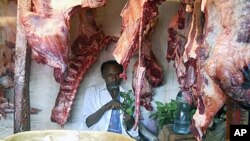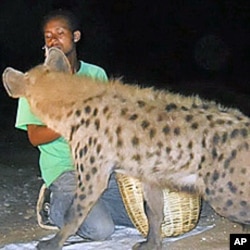The countryside surrounding Harar, an ancient walled city in eastern Ethiopia, is dense with hyenas. The people of Harar say hyenas are not dangerous scavengers; they are a regular part of society.
Salamo Fantan reaches into a straw basket for strips of raw goat meat, and calls the wild hyenas by name. He tosses the meat to some animals, which look like large brown dogs with razor sharp teeth and black jowls. Others approach Salamo and take the meat from his hand, or off a stick in his mouth. A few tourists take pictures, lighting the feeding with the headlights of their taxis.
Across town, Youseff Mume Saleh feeds another family of hyenas with his hands and with his mouth. He says the show goes on with or without the tourists. Feeding the hyenas is a family tradition and a spiritual calling. He says he speaks to the hyenas, and they communicate with him.
When bad news is coming, he says, the hyenas cry. It is hard to find a Harari person skeptical of this claim.
Youseff says the Harari hyenas protect the city from other hyena packs, known to attack children and livestock because they are not well-cared for by their human neighbors. He also says the animals serve as a kind of almanac, predicting the city's prosperity or suffering.
Every year, Muslims in this historically Islamic city gather to celebrate Ashura, the Islamic new year. Hyenas always attend the celebration and are offered a special porridge. If the coming year will be good, they dine. If the year will bring hardship, the hyenas refuse to eat.
The wife of one of the sheiks who hosts the annual event, Kadiga Ali, says the last time the hyenas refused to eat was 2005. That year hyenas in the nearby countryside killed two children, and some cows.
A butcher who sells lamb and goat meat, Adam Mohamad, says the Harari relationship with the hyenas goes far beyond the spiritual. Holes near the gates of the walled city, which is more than 1,000 years old, drain rain water out, and allow hyenas to enter at night, to clean up the city garbage.
Adam also says local hyenas have excellent memories and will seek revenge on humans that harm them or their families. When they come around his store at night, Adam holds strips of meat in hands for the animals to eat. One day one of his neighbors got annoyed and threw a stone at a hyena. In retaliation, the hyena ate one of the man's sheep.
But its not just spirituality, superstition and practicality that tie the Harari people to their neighbor hyenas. It is also friendship. The "hyena men" acknowledge that they feed the animals to make money from tourists, and to prevent attacks on goats, sheep and cows. But, they say, if there were no tourists, and there was no danger to the livestock, they would still feed the animals. More than pets or neighbors, these men say, the hyenas are their family.






